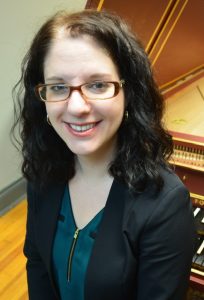Paula Maust

Our guest for this week, Paula is an adjunct professor in the UMBC Department of Music, where she teaches courses in music theory and keyboard skills, harpsichord, piano and organ. She also teaches music theory at Peabody and the Johns Hopkins University and also direct directs her professional baroque music ensembles, Burning River Baroque and Music Spira. Read Our full interview as we discuss her experiences as a first generation college student.
Q: Tell me about yourself: what do you do, what are your goals, what school did you attend, what was your major, etc.?
I am an adjunct professor in the UMBC Department of Music, where I teach courses in music theory and keyboard skills, harpsichord, piano, and organ. I also teach music theory at Peabody and the Johns Hopkins University and direct my professional baroque music ensembles, Burning River Baroque and Musica Spira. My current goals are completing two large research projects: 1) an open-source collection of music theory examples I have curated for use in my courses at http://www.expandingthemusictheorycanon.com and 2) a book project about the pejorative language used to describe the first generation of professional female musicians to appear on the public stage, The Ugly Virtuosa. I completed my B.M. degree in church music and organ at Valparaiso University, my M.M. in organ performance at the Cleveland Institute of Music, my M.M. in harpsichord performance at Peabody, and my D.M.A. in harpsichord from Peabody.
Q:What does being first gen mean to you?
Pursuing higher education has been at the forefront of my identity for as long as I can remember. Outside of books and television, I did not have many role models for what that might look like throughout my childhood. I spent a decade trying to hide that I was a first gen student, because academia has often perpetuated outdated class hierarchies and stereotypes, and I was determined to prove that I deserved a place at the table, even though I came from the rural working class. In the past five years of being a professor, however, my perspective has changed. I see so many of my own first gen students encountering the same issues I faced, and I have become much more open about my own background as a means of modeling for my first gen students that their educational goals are possible.
Q:Tell me about a challenging time and how you overcame it? (in regards to being first gen)?
I worked tremendously hard just to get to college, and despite visibly appearing to fit in with my new peers, my lived experiences had been tremendously different than the other students in the freshman class at the private liberal arts college where I ended up. Academia has unwritten rules– how to address professors, utilize office hours, and find materials in the library–and I felt like everyone else knew so much that was foreign to me. This left me initially isolated and too ashamed to ask for help, because I felt like admitting that I did not know these things would “prove” that I did not belong in higher education. Eventually, I acclimated to my new surroundings and flourished, but only after some significant help from professors who reached out and mentored me.
Q:If you were to go back, what would you do differently? (can be related to being first gen in college or in general)?
I would have asked for help and utilized office hours much sooner!
Q:Do you think being first gen is a negative term? Explain?
I would have definitely thought first gen was negative while I was a student, because I really did not want anyone to suspect that perhaps I did not belong in higher education. My perspective on this has changed significantly in the past five years, however, and I would like first gen students to perhaps “reclaim” the word in a positive way. Being a first gen student often requires one to be more creative, intrepid, and dedicated, and these are qualities and accomplishments that should be celebrated.
Q:What is something you wish you had when you were starting off in school? (resources, mentorship, etc)?
I wish there had been more openness about the challenges facing first gen students and resources aimed at helping us to succeed. I got lucky because I developed mentoring relationships with several professors during my second semester of college, but having someone there from the beginning who could address academia’s unwritten rules and provide guidance on how to navigate college life in general would have been tremendously helpful.
Q:What is something you’d like to see change moving forward in regards to first gens in college?
I would like to see the continued dismantling of class stereotypes and hierarchies, particularly between those who come from highly-educated families and those who do not.
Q:What is your favorite movie, netflix show and/or book?
I am currently reading Ijeoma Oluo’s Mediocre: The Dangerous Legacy of White Male America, which is likely going to make it high on the list of my favorite books!
Q:What is your favorite food?
I love Afghani and Lebanese cuisine.